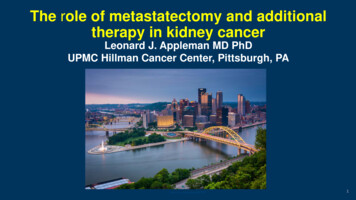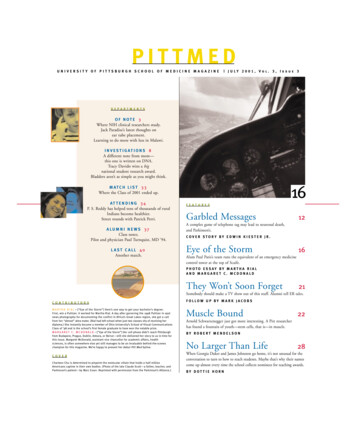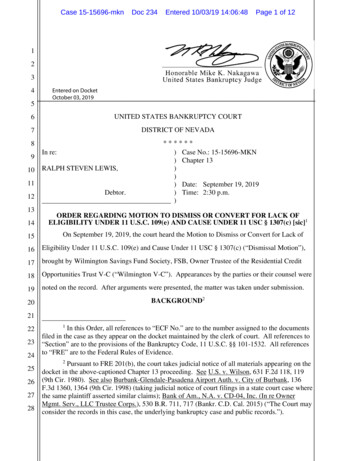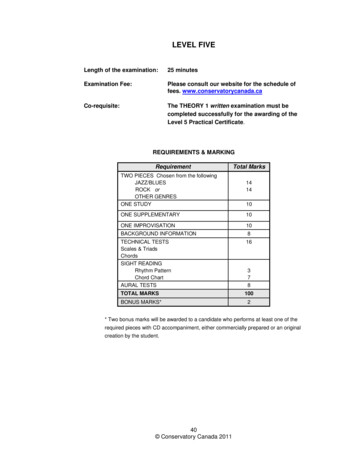
Transcription
The role of metastatectomy and additionaltherapy in kidney cancerLeonard J. Appleman MD PhDUPMC Hillman Cancer Center, Pittsburgh, PALeonard J. Appleman MD PhD1
Case Presentation 62 year old man underwent CT scan after auto collision, andfound to have 8 cm kidney tumor. Underwent nephrectomy2
Case Presentation No evidence of disease following surgery Five years later: 2 cm RLL lung nodule on surveillance CT scan. Feeling well.3
CASE PRESENTATION: What to do next?LOCAL THERAPY?SYSTEMIC THERAPY?OBSERVATION?4
METASTASECTOMYDEFINITION: Surgery to remove cancer beyond the primarysiteCan be performed at the time the primary is removed orYears laterRATIONALE: Alleviate or prevent local symptoms Control the cancer: Help the patient live longer withgood quality of life Obtain tissue for molecular analysis5
METASTASECTOMY Control the cancer: Help the patient live longer withgood quality of life 1. Avoid systemic treatment and its potential toxicities or 2. Follow up with systemic treatment: Delay thedevelopment of resistant clones6
METASTASECTOMYSHOULD WE DO IT?Do the risks of the operation outweigh thebenefit from removing the visible cancer ?7
ANCIENT HISTORY OF SURGERY FOR CANCER400 BC Hippocrates describes the stages of cancer andadvises against surgery for advanced disease11. Principles of Surgical Oncology Dr. Khdair Al-Rawaq8
Does Metastasectomy help patients?How do we know?Randomized Clinical Trial ?10
Does Metastasectomy help?How do we know?Randomized Clinical TrialPERSONAL EXPERIENCEEXPERT OPINION11
METASTASECTOMYSHOULD WE DO IT?WHO WILL BENEFIT?All patients are not the sameHow can we tell?12
METASTASECTOMY-WHAT FACTORS PREDICTLONGER TIME UNTIL RECURRENCE?NUMBER OF METASTATIC SITESDISEASE-FREE INTERVAL2019: No set “formula” or highly evidencebased approach. Treatment is individualizedbased on clinical features, MD experienceand patient preference13
Case Presentation Continued 62 year old man underwent nephrectomy for T3a ccRCC 5 years ago. CT now: 2 cm RLL lung nodule Nodule Resected No evidence of disease following surgery Medical oncologist recommends close follow up Thoracic Surgeon is FURIOUS that no systemic treatment is offeredafter the operation 14
The Metastasectomy Dilemma Metastasectomy has been performed for mRCC for over 80years. Synchronous: at time of nephrectomy; Metachronous: later Risk of recurrent disease is high No systemic therapy has been shown to improve outcomesin patients NED after metastasectomy:UNMET NEEDLeonard J. Appleman MD PhD15
A randomized, open label, multicenter phase 2 study, to evaluate the efficacy of Sorafenib in patients with advanced Renal Cell Carcinoma (RCC) after a radical resection of themetastases: RESORT trial.Presented By Giuseppe Procopio at 2018 ASCO Annual Meeting
RESORT: Study DesignPresented By Giuseppe Procopio at 2018 ASCO Annual Meeting
mRFS in the two treatment armsPresented By Giuseppe Procopio at 2018 ASCO Annual Meeting
Randomized, double-blind phase III study of pazopanib versusplacebo in patients with metastatic renal cell carcinoma who haveno evidence of disease following metastasectomy: A trial of theECOG-ACRIN cancer research group (E2810)Leonard J. Appleman, Maneka Puligandla, Sumanta K. Pal, Wayne Harris, Neeraj Agarwal, Brian A. Costello,Christopher W. Ryan, Michael Pins, Jill Kolesar, Daniel A. Vaena, Rahul A. Parikh, Mehmood Hashmi, Janice P.Dutcher, Robert S. DiPaola, Naomi B. Haas, Michael A. Carducci;UPMC Hillman Cancer Center, Pittsburgh, PA; Dana Farber Cancer Institute, Boston, MA; City of HopeComprehensive Cancer Center, Duarte, CA; Emory University School of Medicine, Department of Hematologyand Medical Oncology, Winship Cancer Institute of Emory University, Atlanta, GA; Huntsman Cancer Institute,University of Utah, Salt Lake City, UT; Mayo Clinic, Rochester, MN; Oregon Health & Science University, KnightCancer Institute, Portland, OR; University of Illinois College of Medicine, Chicago, IL; University of WisconsinCarbone Cancer Center, Madison, WI; University of Iowa Hospitals and Clinics, Holden Comprehensive CancerCenter, Iowa City, IA; University of Kansas Cancer Center, Westwood, KS; University of Kansas, Kansas City, KS;Our Lady of Mercy Cancer Center, New York, NY; University of Kentucky, Lexington, KY; Penn MedicineAbramson Cancer Center, Philadelphia, PA; Sidney Kimmel Cancer Center At Johns Hopkins, Baltimore, MDLeonard J. Appleman MD PhD19
Pazopanib Pazopanib has been a standard of care for first-line systemictherapy for metastatic RCC based upon improved progression-freesurvival (PFS) compared to placebo (Sternberg et al. 2010). PFSwas non-inferior vs. sunitinib and favorable patient reportedoutcomes (Motzer et al. 2013). Utility of VEGF-targeted agents in the NED (adjuvant or postmetastasectomy) state was unknown at study conceptionLeonard J. Appleman MD PhD20
E2810 Hypothesis12 months of pazopanib treatment will increase diseasefree survival in patients with metastatic RCC who havebeen rendered radiographically disease free by surgicalmetastasectomyLeonard J. Appleman MD PhD21
E2810 STUDY SCHEMARCC M1ResectedTo NEDNo PriorSystemicTherapyPazopanib 800 mg qdRANDOMIZATIONStratification:DFI or 1yr1 or 1 site resected52 weeks RxCT q3moPlacebo 800 mg qdDFI: disease-free intervalDFS: disease-free survivalPRO: patient reported outcomeLeonard J. Appleman MD PhDEndpointsDFSOSAEsPROsLab Correl.
Pazopanib did not improve disease-free survivalLeonard J. Appleman MD PhD23
Pazopanib did not improve disease-free survivalMedian follow up-30 months83/129 DFS events (64%)36 month DFS:Pazopanib26%Placebo22%(estimated 25% at start ofstudy)Leonard J. Appleman MD PhD24
OUTCOMES AFTER METASTASECTOMYMEDIAN VS. “TAIL OF THE CURVE”Ribas,Hersey, Middleton, Gogas, Flaherty, Sondak, Kirkwood 2012
Trend toward improved disease-free survival for disease-freeinterval 1 yearThe HR for 1 yr. versus 1 yr. 0.55 (0.35, 0.87)log rank p-value 0.01Leonard Appleman MD PhD26
DFS by Stratification Factor: Number of Resected SitesLeonard Appleman MD PhD27
CYTOREDUCTIVE NEPHRECTOMYOne third of patients with renal cellcarcinoma present with metastaticdiseaseHypothesis: removal of primarytumor will be beneficialBecause 1. Alleviation of tumor-mediatedimmune suppression
Two Randomized studies: Newly diagnosed metastatic RCC with primary in place:Interferon-α2b*vs.Cytoreductive nephrectomy followed by Interferon-α2bSWOG (n 241) and EORTC (n 83); 1990s*Median PFS 5-6 months. Response rate 6%.Significant chronic and constitutional toxicity
Cytoreductive nephrectomy IFN vs IFN Alone:Combined SWOG/EORTC OVERALL SURVIVALHR 0.67 (Median 13.6 v 7.8 months)
1990s-2006Interferon-a2b2006-2013Targeted RxSorafenib, sunitinib,temsirolimus, everolimus,pazopanib, axitinib,bevacizumab,cabozantinib
Is there a benefit to cytoreductivenephrectomy for patients treatedwith targeted therapy againstVEFG and other pathways?
Heng et al. Overall SurvivalOnly for pts with 1,2 or 3 out of 6 possibleIMDC risk factors
Heng et al. Overall SurvivalOnly for pts with 1,2 or 3 out of 6 possibleIMDC risk factors
Heng et al. Overall SurvivalOnly for pts with 1,2 or 3 out of 6 possibleIMDC risk factors
Carmena : Cytoreductive nephrectomy followed by sunitinib versus sunitinib alone in metastatic renal cell carcinoma (mRCC) - Results of a phase III non-inferiority trial. br/ (NCT00930033)Presented By Arnaud Mejean at 2018 ASCO Annual Meeting
CARMENA: Prospective, multicenter, open-label, randomized, phase 3 non-inferiority studyPresented By Arnaud Mejean at 2018 ASCO Annual Meeting
Overall br / survival (ITT)Presented By Arnaud Mejean at 2018 ASCO Annual Meeting
Progression free survival (ITT)Presented By Arnaud Mejean at 2018 ASCO Annual Meeting
CARMENA STUDY How should/will this change practice? Would be helpful to know aboutpatients who were not considered forthe study and went to surgery asstandard of care because physician orpatient preference (includingoutcomes). How to reconcile with IMDC data?
1990s-20062006-2016Interferon-a2bTargeted RxSorafenib, sunitinib,temsirolimus, everolimus,pazopanib, axitinib,bevacizumab,cabozantinib2019PD-1 antibodies,Combos
FUTURE DIRECTIONSMetastasectomy and Immune checkpoint inhibitors Oligometastatic disease allowed in ongoing adjuvantrandomized studies: PROSPER-RCC (EA8143, NCT03055013) (metastasectomyallowed within 12 weeks of nephrectomy). (Nivolumab vs.observation; pre/post-op; L. Harshman, P.I.) KEYNOTE 564 (NCT03142334; Pazopanib vs. placebo(metastasectomy allowed within 1 year) IMmotion010 (NCT03024996; atezolizumab vs. placebo;metachronous or synchronous metastasectomy allowed)Leonard Appleman MD PhD43
EA8143 Study UpdateA Phase 3 RandOmized Study ComparingPERioperative Nivolumab vs. Observation inPatients with Localized Renal Cell CarcinomaUndergoing Nephrectomy (PROSPER RCC)Lauren Harshman, MDEA8143 Study ChairECOG-ACRIN Fall Group MeetingOctober 2018Fort Lauderdale, FL44
EA8143 PROSPER RCC: Adjuvant Therapy with a TwistPrimary endpoint: RFSSecondary EP: OS, RFS in clear cell subset Need the trifecta: presurgical priming with PD-1 blockade necessary for enhanced efficacy 1 adjuvant dose may not be sufficient further engage with adjuvant therapy No Placebo—patients really do care about this!Urology PI: Allaf; PIs: Harshman/McDermott, MANY OTHERS45
ADDITIONAL LOCAL TREATMENT OPTIONS Radiation Therapy (including stereotactic radiation) Kidney cancer not particularly sensitive to radiationbut new techniques can achieve higher doseswithout damage to normal tissues Thermal energy techniques Cryotherapy (tumor ice ball) Radiofrequency ablation (kill it with fire!) Embolization/chemoembolization46
Future treatment paradigm? Pre-operative priming with immunotherapy (anti-PD-1) Surgery to remove metastasis Post-operative immunotherapy and close monitoring.47
Medicine vs. Surgeryvs.48
Medicine AND Surgery(for some patients)49
THANK YOU50
Pazopanib did not improve disease-free survival Leonard J. Appleman MD PhD. 24 Pazopanib did not improve disease-free survival Leonard J. Appleman MD PhD. Median follow up-30 month










